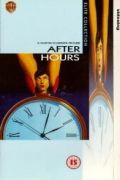
Directed by
Martin Scorsese
96 minutes
Rated M
Reviewed by
David M Brown

After Hours
Synopsis: Paul Hackett (Griffin Dunne) is stuck in a dead-end job and feels that his life is going nowhere. After a chance meeting with a beautiful young girl, Marcy (Rosanna Arquette), he calls her up and goes on a date. To say things go wrong would be an understatement.
The only way for Martin Scorsese was down. Having given us arguably some of the finest contemporary American films with Mean Streets (1973), Taxi Driver (1977) and Raging Bull (1980) he was about to direct his long-cherished dream project, a big budget epic The Last Temptation of Christ. The project fell through at the last minute (he did direct it in 1988). Needing to get back to his roots he wanted to make a low budget film back in his hometown of New York and looked back at a script he had been offered by producer/actor Griffin Dunne and producer Amy Robinson. The result, After Hours, is a modestly absurdist comedy of errors.
Depicting a single night's adventure in the Big Apple, After Hours charts a succession of excruciating events as our hapless hero desperately tries to get from Soho to the other side of town after foolishly taking up the siren call of Arquette's Marcy and embarking on a walk on the wildside.
Scorsese’s direction is extraordinary, his camera flies in every direction, the nervous energy as he pushes his actors and crew to the edge is apparent in every frame. The trump card, however, is Griffin Dunne, who gives a wonderful performance as Hackett, the would-be lover-boy. Although appearing in such cult classics as An American Werewolf In London his career never really flourished. Unfortunately he will be better known by younger audiences as Madonna’s romantic foil in the dreadful Who’s That Girl? (1987). Whilst still regularly appearing on screen and television and also having a successful behind-the-camera career as the director of Practical Magic and Addicted To Love, this is his finest hour to date
The rest of the top drawer cast, including Rosanna Arquette, Teri Garr, Linda Fiorentino, John Heard and Cheech and Chong, all play excellent cameos as they contribute to our hero’s nocturnal nightmare. Even Roger Corman regular, Dick Miller, makes an appearance as a late-night diner owner, no doubt as a lid-tipping homage to the man who first gave Scorsese work (Scorsese is also briefly seen operating a spotlight in a trendy nightclub).
After Hours is a kind of comedic precursor to Scorsese's The King Of Comedy (1982), a film which is one of the great American black comedies. Relatively it is a minor inclusion in the director's oeuvre, somewhat dated in its '80s stylings and, as is so often the case with films that are based on an ever-spiralling series of absurdities, unable to find a satisfying resolution to the concatenation of mad-cap events. Nevertheless it is worth checking out if only as anotherangle on the director’s beloved home town.
Want something different?





